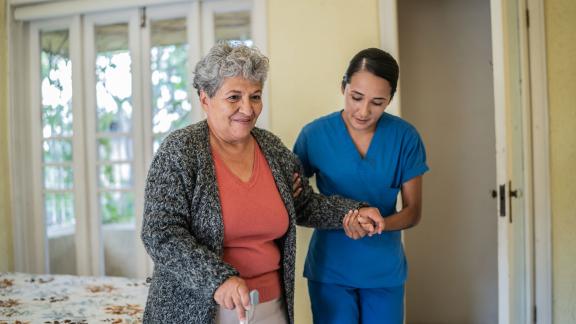Delivering clinical T Level industry placements: Frimley Health NHS Foundation Trust
Frimley Health NHS Foundation Trust (FHFT) saw hosting industry placements as an opportunity to support the development of its future workforce. The trust worked with Bracknell and Wokingham College to pilot a range of health T Level industry placements in clinical settings and is looking to expand into science and non-clinical areas in the future.
What the organisation did
While attending an Education and Skills Funding Agency (ESFA) employer roadshow in 2017, FHFT volunteered to pilot T Level industry placements in its local area. The trust had already been working closer with its local colleges and community to increase the variety of work experience options available and saw this as another opportunity to engage with the local community.
The trust approached three local colleges and held meetings with each to determine whether they were ready to start delivering T Levels and industry placements. Some colleges wanted to trial a work experience model which is not suitable for T Levels, so the trust opted to work with the college that wanted to pilot a full industry placement for the health T Level.
To recruit students for the pilot, FHFT’s learning and development manager was invited by the college to talk through the application process and expectations with potential students. This gave the trust a better understanding of the students’ goals and whether they aligned to the trust’s values, so they could match the students to the most relevant department. FHFT requested students complete their industry placement in the second year of their T Level as they would have an increased industry knowledge and were more prepared to be in a working environment.
To assign industry placements within the trust, the learning and development manager attended department and nursing workforce meetings to raise awareness of T Levels and promote the opportunity to make the most of the future talent pipeline available through T Levels. Wards, the emergency department, radiology, outpatients and theatres were keen to offer industry placements, and could offer activities such as dressing, washing and feeding patients, and emptying catheters (students would complete infection control training) as part of the industry placement.
Students received a full corporate induction like any other member of staff, focusing on the trust’s values and completed mandatory training. Students were assigned a buddy who supervised the clinical care provided to patients. FHFT worked collaboratively with the college and students to agree a workplace project for them to undertake. The buddy and managers received an outline of the project such as a ward audit and a guide to support them with students’ roles and responsibilities.
After reviewing outcomes from the pilot, the trust has introduced a learner contract which supports students to understand behaviours and expectations in the workplace such as punctuality and informing their manager when they’re unable to attend the industry placement. They also have one to one meeting to reinforce trust values and behaviours.
Overcoming obstacles
Some colleges in the local area needed more time to understand and gain confidence in T Level delivery. FHFT did not work with them on the pilot, instead they will work with them next year.
A number of people from the college were initially involved in developing the industry placement which led to confusion and duplication. The trust therefore asked for a single point of contact at the college for T Levels. This improved communication between the trust and college.
Positive outcomes
- Evaluating the pilot has supported the trust’s planning for next year, including offering T Levels with multiple colleges.
- The trust has been able to build links and relationships within its local community.
Next steps
The trust is also looking to introduce industry placements into non-clinical areas, including childcare, carpentry and estates. To meet this demand, FHFT will work with more colleges, and has already drawn up a timetable to manage increased industry placements and ensure consistent quality.
FHFT sees real opportunity for T level students to join their workforce in band 2 roles on completion of a T Level course. They have already developed a T Levels route from healthcare assistant to nursing and see the potential to develop further pathways.
In order to maximise learning and provide opportunities for the students, next year’s cohort will also complete their care certificate.
Takeaway tips
- Could your organisation pilot industry placements?
- Where might industry placements work well in your organisation?
- How can T Level students support your team to deliver work?
- Are there activities that your team has always wanted to do but never has time to, that a T Level student could support in completing?
- What benefits could your organisation gain from providing industry placements? For example, could team members gain line management or mentoring experience?
2023 Update
Progress with T Level placements
T Level Industry placements at FHFT are finishing a second successful year and now host placement students from three different colleges. Their first cohort of five students have just finished and are now moving onto their next steps, including studying nursing at university, nursing training with the armed forces and considering midwifery.
Learning from the pilot and first cohort
- Industry placements worked best with students on placement for two days a week. When students attended five days a week there was difficulty in ensuring the same mentor was available given shift patterns.
- Students preferred to attend less regularly given transport costs and wanting to work alongside their placement mentor.
- Some students felt unprepared for their placements, so the trust created a workbook with information about the trust, the placement structure and all relevant documentation they need to complete.
Promoting a varied student experience
Students have a career focus to their taster week, including an opportunity to experience a patient journey, which outlines the many and varied careers in the NHS to encourage them to consider roles beyond their T Level occupational specialism. They are also speaking to providers about the viability of allowing placements across different workforce areas. This could allow a student to be placed with allied health professionals who work on ward to gain relevant adult nursing experience simultaneously.
Plans for the future
FHFT currently hosts students on the Healthcare Science and Health T Level placement and are looking to expand the range they offer. They are looking into offering digital T Level placements in their Digital Support Services Team and may also add childcare as there are nurseries onsite, pending a college in the area offering the relevant T Level.
The trust is rapidly increasing placement numbers, with eventual numbers set to be over sixty students across their three sites per cohort. This has been logistically challenging, mitigated in part by assigning one provider to each site. The trust believes placement capacity will not be reached at this point, however they may need to consider alternatives, such as exploring placements outside of nursing, if student numbers increase further.
From student on placement to NHS employee
The trust has a plan to integrate T Levels students into their workforce once they pass. They recommend students to apply for band 2 roles such as healthcare support worker and complete the care certificate, to consolidate their learning. After their 6-month probation, they could apply for the nursing associate programme or registered nurse degree apprenticeship.



